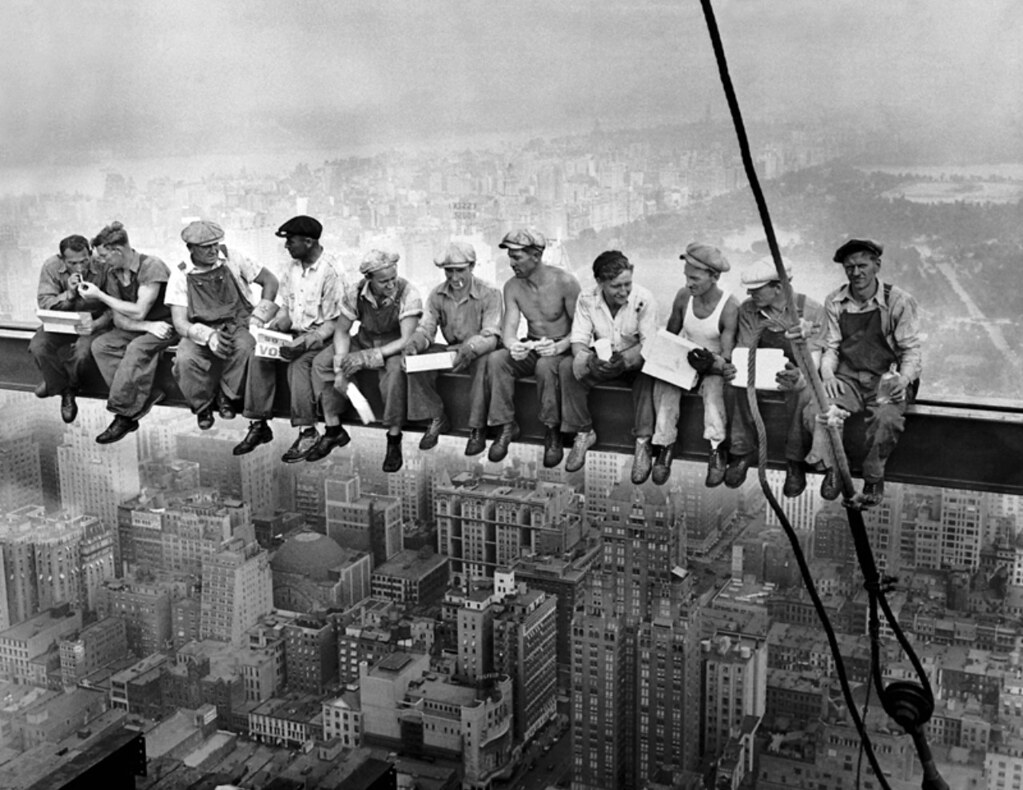"Democrats abandoned ordinary Americans."
It's not true. But it's stuck, like a craw in the mouth of the American voter (and the American pundit). And the big question amongst Democratic strategists is how to dislodge it.
My latest idea, in my ongoing quest to become the Democratic Party's Francis Coppola, is to explicitly run with a narrative that says "yes, this is your Grandfather's Democratic Party" -- directly tying oneself to JFK and the New Deal and the civil rights era and that whole period where (supposedly) the Democratic Party was the party of ordinary Americans. Cut to lines about:
- Defending labor unions.
- Bringing back honest, well-paying jobs that can support your family.
- Taking on the billionaires robbing our democracy.
- Protecting civil rights.
- Restoring a women's right to choose.
All intercut with images of modern workers interspersed with older imagery (the March on Selma, men on girders building skyscrapers, etc.) that evokes the good old days.
What's the point of the ad? Basically, it's to create a permission structure for people who have -- for whatever reason -- internalized the narrative of "the party left me" to tell themselves things have changed again. They're not voting for the modern Democratic Party that Fox News has created for them in their minds over the past few years (latte-sipping coastal elites blah blah blah), they're voting for the mythologized Democratic Party of yesteryear that the Fox News caricature is tacitly juxtaposed against -- the party of the New Deal and of JFK, the party that was a working-class party, the party that built things and fought for everyday Americans.
"Mythologized" is important. Obviously, in reality the Democratic Party of that era (or any era) was not some clarion beacon of the worker's voice; nor was it some uncomplicated bastion of civil rights and women's rights advocacy. I know that, you know that. I also know that "ordinary Americans" is a loaded term, that the past wasn't actually that great for a whole lot of people, and so on.
But we're not writing a history paper here, we're dealing with a mood, and that mood is not especially connected to historical reality. How many times have you heard someone say that the current Democratic Party "just keeps moving to the right" (when it is beyond obvious that the Biden administration is the most progressive Democratic administration in my lifetime)? Objectively, it is impossible to defend the notion that the Democratic Party leadership is more conservative now than it was during the Clinton administration. In reality, making a show of affirming people who think "well, back then Democrats were fighting for me" is worth playing a bit of make-believe. Nostalgia is a hell of a drug, and just the gesture of "this is a change in a direction that makes you feel fuzzy" can have an outsized impact. The past wasn't actually that great, and modern changes are good actually. But if you can make people feel as if the things we're pulling for now are simply a restoration of the hazy memories they have when things were inchoately "better" (or "less complicated" or "less divided" or whatever), you're in a very good position.
I'm not saying the idea is perfect. In particular, even as a subversion of the "not your grandpa's ..." frame, the tagline still is a rough one at a time when many people are aggrieved at the "gerontocracy" in American politics. So workshop the hell out of this. I'm not prideful about it. But I think there's something here. The great insight of the contemporary conservative movement is in how they manage to fuse their present-day reactionary values as if there were simply a restoration of the greatness of the founders (I read one constitutional commentator describe originalism as "ventriloquizing the present through the past"). Democrats can do it too -- and as the Republican Party falls deeper and deeper into the grip of billionaire oligarchs and weird paranoid extremists, there's an opening here we can and should exploit.


1 comment:
"Nostalgia is a hell of a drug" is exceptionally true. Especially when that past is, even for its beneficiaries, entirely mythologized. The primary example for that for me is West Virginia. It's a deep red state now, and that's at least in part (ignoring race and all the other factors) down to the idea that West Virginia was a prosperous coal state until environmentalists in cahoots with Democrats declared war on coal. That was always a myth.
Reality is, West Virginia was always a poor state, other than a blip in the energy crisis years of the 70s where it surged to... around the US median. And coal as an employer pretty much evaporated in the Reagan years due to automation, and then even further in the Clinton years due to development of less labor intensive extraction techniques. Immediately before Covid, the coal industry employed less. than 2% of the state's labor force, or between a quarter and a fifth of the number of corporate workers Amazon employs in Seattle (and about equal to the number that Amazon employs in Bellevue, directly across the lake). Yet, there's this idea among West Virginians that they can elect Trump and make coal great again. It's not gonna happen, but it may be a remarkably durable political sell even as coal stays exceedingly irrelevant.
Post a Comment